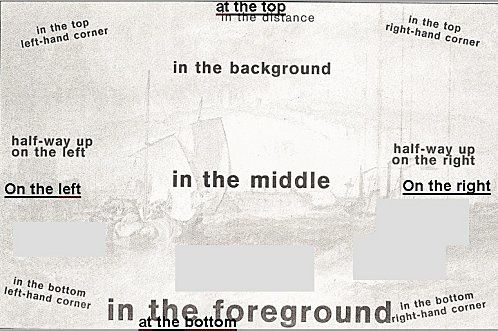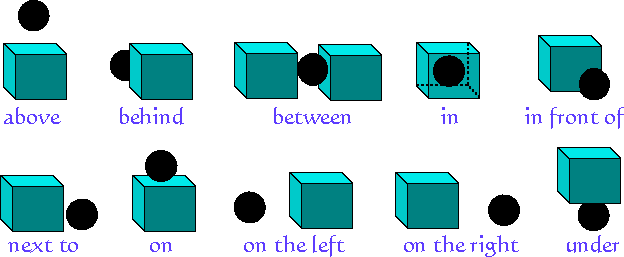
WELCOME to the Terminale S 7 pupils of 2014-2015 !
Ci-dessous dans cet article, tout au long de l'année, vous trouverez divers documents en relation avec le cours d'anglais.
Vous pouvez aussi faire quelques révisions. Vous trouverez des liens vers des sites de ressources et d'exercices interactifs variés dans les articles suivants : "Interesting Links for GRAMMAR", "Interesting Links for VOCABULARY", et "Interesting Links - and info - for BAC and METHOD".
A piece of advice (= un conseil) : mieux vaut en faire peu à la fois et régulièrement, que longtemps à "chaque" fois et peu souvent !
SCHEDULE of English classes:
Thursdays: from 3:00 pm to 3:55 pm.
1) Epreuves d'anglais du Baccalauréat:
- You will find lots of useful information on the final exam you will take this year, in this article.
2) You may want to check your skills at "classroom English":
b) Here is a sheet you can print (= Voici une feuille que vous pouvez imprimer) and keep in your notebooks if you need help (= si vous avez besoin d'aide):
.

.
.

.


.


.
.
.
.
Avant de commencer l'écoute, munissez-vous d'une feuille de brouillon et d'une copie propre. Assurez-vous d'avoir 16 minutes devant vous sans que personne ne vienne vous interrompre dans votre travail... coupez votre portable...
.
.
b) Here is the transcript:
Every day, you take advantage of (1) all kinds of services – mobile, social media, free Internet search, and more. When you use these services, you’re sharing (2) information about yourself - with friends, with businesses (3), while you’re out and about (4), while you’re at home. That information is shared and sold – within businesses, with their affiliates (5), with ad networks (6).
So on a typical day you might shop at a store and use a loyalty card (7) to take advantage of a sale ; and your shopping habbits may be shared or sold.
You might need to fill a prescription, and your prescription history may be shared or sold.
You might use a daily coupon app to get a deal (8) at a nearby restaurant, and your location information may be shared or sold.
You might visit a new site where you notice an ad for your favorite brand (9) of shoes. It’s an online sale, this weekend only, so you buy a pair. And the articles you read and your shoe preferences may be shared or sold.
You might log in to a social network, and see that your friends are filling out an all-about-me quizz. You get the quizz app and share your answers, and your quizz responses and profile information may be shared or sold.
A regular day: you’ve taken care of business, used some free services, gotten some good deals, and revealed all kinds of information about yourself. So at the end of the day, the question is “Who has your information, and where is it going next ?”
1) to take advantage of = profiter de
2) to share = partager
3) business = les affaires / businesses = des entreprises, des compagnies
4) to be out and about = être en promenade, à l'extérieur
5) an affiliate = un partenaire, un associé
6) an ad network = un réseau publicitaire
7) a loyalty card = un carte de fidélité
8) to get a deal = faire/profiter d' une bonne affaire
9) a brand = une marque (d'un produit).
.
.
.
.
.
.
.
Now that we’re living most of our lives online, all of us are vulnerable to the Internet, and the difficulty with young people is: they may not have experienced the dangers of not being able to escape your past until it’s too late.
But there are other forms of education. There is a movement in Europe on behalf of digital forgetting which is having marches and rallies, which I think is tremendously helpful (...)
interviewed by Clifford Armion
29th November 2012, Hôtel de Région, Lyon
Clifford Armion: What do you think of the generation we call the digital natives? Are they vulnerable when they use the internet and the social networks?
C.A.: How do you educate a child or a young adult to use the internet responsibly and to be careful when creating his digital identity? Is it the role of the parents or the role of the state to do that?
J.R.: I think you tell stories like the one I’ve just told. By giving examples of people who have suffered in tangible ways because of their internet profiles you may persuade people to live more responsibly. I have students who are educating themselves about this and right before they apply for jobs – I teach at a law school – they’ll often go to their Facebook page and clean it up. They’ll take down some of the embarrassing pictures although they tell me they have to leave up one or two so that their employers don’t think they have something to hide. They have to seem to be authentic.
There are other forms of education. There is a movement in Europe on behalf of digital forgetting which is having marches and rallies which I think is tremendously helpful. There are also technologies that can help educate people. Google has a feature called Google Goggles that will ask you to think twice before you send an email late on Saturday night so that if you’ve been drinking a little too much, maybe you shouldn’t send the email. It asks you to wait until the next morning and think better of it. Most of all we need to be educating ourselves as citizens and thinking “what sort of face do we want to present to the world? How important is our reputation? What an offence to dignity do we experience when we are judged out of context on the basis of pictures, photos or chat intended in one context and which are wrenched out of context. It’s a terrible indignity and I think the costs are very serious.
C.A.: During the Arab Spring, we’ve seen that social networking was a central element of the uprising. Internet is also increasingly used by mainstream politicians as a medium of information, or a medium of propaganda. Is there a difference between the internet and the more traditional media in the way it is used to propagate ideas?
J.R.: It is such an important and complex question. In the most obvious sense, the internet can disseminate political content very broadly and that can both engage and help organise, as happened during the Arab spring, or it can enrage and create violence as happened in response to the anti-Muhammad video which set the Middle-East ablaze a few months ago. The precise role of the social media in the Arab Spring is contested. There are some, like Malcolm Gladwell of the New Yorker, who say that “the revolution will not be tweeted”, that the social media can be useful in helping coordinate groups that are already organised. It cannot create those groups out of whole cloth and it’s not itself responsible for political change. Of course the threats to liberty that we’ve seen in the wake of the Arab Spring confirm the fact that the internet by itself is not a panacea that guarantees individual rights. There’s also the possibilities for tremendous freedom of expression and empowering people who wouldn’t have had access to the media before. But there are also new opportunities for repression. The efforts of Egypt to pull the switch on the internet during the Arab Spring, and more recently calls throughout the Middle-East to censor the anti-Muhammad video as a form of blasphemy were reminders that freedom will not necessarily flourish just because everyone now has access to Tweeter and the web. There’s also the very interesting new role of intermediaries like Google and Facebook who now have more power over free speech and free expression than any king or president or judge. It was the lawyers of Google who decided to leave up the anti-Muhammad video in some countries and to take it down in others despite the calls by both President Obama and the president of Egypt for the video to come down everywhere.
C.A.: The Los Angeles Times recently published an article on how President Obama called on Americans to use the social media to pressure Congress. Could this become common practice?
J.R.: I saw that fascinating article and what’s so interesting about it is that it’s the first time the president has turned to social media to try to circumvent lobbyists and to reach Congress directly. Usually it was the other way round. The most recent example of this was an online protest against the ‘stop online piracy act’, a very draconian copyright bill which President Obama had initially supported, but after a huge online protest which mobilised thousands of netizens, the White House backtracked and decided to oppose this bill. So before now we’ve seen social media organising in ways that have challenged both the president and Congress, and of course the bill died in Congress after those protests too. Now for the first time we’re actually seeing the president of the United States trying to mobilise young people using social media. We’ll see how effective it is. He’s up against some pretty serious lobbyists and entrenched political interests, so it will be a good test of the ability of social media to get some traction. I think it is encouraging that President Obama is turning to social media in order to get his message out.
.
.
.
.
- Extract from Michael Ondaatje's The Cat's Table (2011).
- Extract from Elif Shafak's Honour (2012).
- "Thxgving": a 2011 cartoon by Matt Wuerker.
- Norman Rockwell’s "Freedom from Want".
- "Flash Looting”: CNN article, August 17th, 2011.
- "Sharing information: a day in your life": a video by OnGuardOnline.com.
of Jeffrey Rosen (November 29th, 2012).

.
21) Practice makes perfect:








